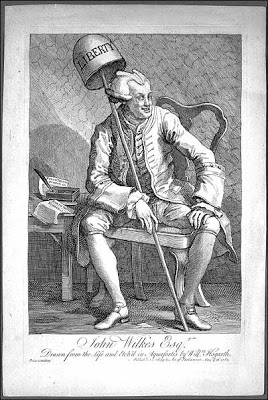Date: Boston, June 6, 1768
Illustrious Patriot
The friends of Liberty, Wilkes, Peace and good order to the number of Forty five, assembled at the Whig Tavern Boston New England, take this first opportunity to congratulate your Country, the British Colonies and yourself, on your happy return to the land worthy such an Inhabitant: worthy! as they have lately manifested an incontestible proof of virtue, in the honorable and most important trust reposed in you by the County of Middlesex.
May you convince Great Britain and Ireland in Europe, the British Colonies, Islands and Plantations in America, that you are one of those incorruptibly honest men reserved by heaven to bless, and perhaps save a tottering Empire. That Majesty can never secure but in the Arms of a brave, a virtuous, and united people. That nothing but a common interest, and absolute confidence in an impartial and general protection, can combine so many Millions of Men, born to make laws for themselves; conscious and invincibly tenacious of their Rights.
That the British Constitution still exists is our Glory; feeble and infirm as it is, we cannot, we will not despair of it. To a Wilkes much is already due for his strenuous efforts to preserve it. Those generous and inflexible principles which have rendered you so greatly eminent, support our claim to your esteem and assistance. To vindicate Americans is – not to desert yourself.
Permit us therefore much respected Sir, to express our confidence in your approved abilities and steady Patriotism. Your Country, the British Empire, and unborn millions plead an exertion, at this alarming Crisis. Your perseverance in the good old cause may still prevent the great System from dashing to pieces. ’Tis from your endeavors we hope for a Royal “Pascite, ut ante, boves”;1 and from our attachments to “peace and good order” we wait for a constitutional redress: being determined that the King of Great Britain shall have Subjects but not Slaves in these remote parts of his Dominions.
We humbly present you the Farmer. His sentiments are ours.
If we dare lisp a wish to be indulged with a line from you a direction to John Marston Esq. at the Whig Tavern Boston would assuredly reach the hands of Worthy Sir
Your most faithfull and obedt. humble Servants, Committee of the Sons of Liberty in the Town of Boston
Benjamin Kent
Tho Young
Benjamin Church junr.
John Adams
Joseph Warren
1 “Put your cows out to pasture as you did before,” that is, before your farm was taken; Virgil, Eclogues, 1.46. [Note: this footnote is original to the edition consulted]
Source: Committee of the Boston Sons of Liberty to John Wilkes dated June 6, 1768, The Adams Papers, Boston: Massachusetts Historical Society, Series III, Vol. I, pp. 214-216
Commentary: Joseph Warren continues, here alongside John Adams, Dr. Thomas Young, Dr. Benjamin Church, and Benjamin Kent (1708-1788), to be active in Boston Sons of Liberty initiatives. By order of signatures Kent appears to be the lead author. In an older blog entry, J.L. Bell described some of Kent’s later activities. The writers represent themselves simply as Whigs from Boston, as assembled at the Whig Tavern. Within a year the Boston Sons of Liberty gained sufficient elected representation and clout to lay claim to authority of the Town of Boston.
John Wilkes was then the best known voice of British Whigs. Issue forty-five, alluded to in this letter, of Wilkes’ magazine became a lightning rod for controversy in its expression of Whig principles and attempted Tory efforts to censure it. “The Farmer,” is John Dickenson of Pennsylvania, whose pamphlet was written under that pseudonym, humbly argued for American liberties within the British Empire. This letter apparently enclosed Dickenson’s pamphlet, though I infer that Wilkes must also have received copies via more direct means.
Overall this document alerts celebrity Whig John Wilkes of the existence of the Boston Sons of Liberty and curries favor with British Whigs.

 Follow
Follow